Book Review: The Galaxy Game
By: Karen Lord
Published By: Del Rey
Publication Date: January 6, 2015
Page Count: 336
Buy it at Amazon, Barnes & Noble, or IndieBound
Source: ARC Kindly Provided by Publisher
Audience: Young Adult/Adult - Science Fiction
I was completely enthralled by the first 75% of this book, but the last quarter really didn’t work for me which makes this a difficult review to write. I will try not to reveal too much, but be warned: there will be two minor spoilers in the 4th paragraph of this review.
Rafi is a psy-gifted young man in a society that doesn’t really know how to handle citizens with that type of talent. We meet him as he is escaping the strictures of a school for similarly “gifted” students and going on the run from the planetary government. His best friend, Ntenman, joins him as he heads across the galaxy to a more accepting planet called Punartam. The story follows Rafi and Ntenman as they negotiate their places in a society where political and social relationships are currency and potent forces are in play that may change the balance of power in the galaxy.
One of the most impressive parts of this book is Karen Lord’s world building - an essential element of any SF novel. The author has to convince the reader that her world is a reasonable extrapolation of what we know in real life, given certain assumptions. In that way, the setting is almost as much a character in the novel as any living, breathing being. And Lord’s world building skills are exceptional. I believed in each society she explained and in how their differences came to be. The politics between the different worlds and factions within each world were intricate and plausible which pleases the former political science major in me no end.
Although this book may be marketed as a stand-alone novel or as a YA novel, I think that may be a bit misleading. Lord definitely follows the adult SF convention of just dropping the reader into the fictional universe without a lot of explanations; the reader is left to piece together what the rules/norms of the world are bit by bit. I am almost always game to go along with authors who do that, because there is usually an enormous payoff for doing so, but I have to confess this time it felt pretty difficult. Two things that definitely should have been explained in greater detail are the social credit economy on Punartam and how the Walls actually work. However interesting the concepts, I still don’t feel as though I have a good grasp of either. Some of this may have been dealt with in another novel set in this universe, I don’t know, but if this book is to be truly “stand-alone” then I would expect more explanation.
The first 75% of the novel fascinated me and kept me thinking about Lord’s worlds even when I wasn’t reading, but the story sort of fell apart for me near the end for two reasons. First, I wanted more about the game of Wallrunning. I think the end of the novel would have been more effective had we seen more of Rafi (or anyone really) playing the game. Second, the two main characters are still in their mid- to late-teens and I have a hard time believing that they would have ended up being put in such important positions.
If I didn’t enjoy the universe this novel was set in so very much, I wouldn’t be as bothered by the last quarter of the book. I would, however, still read other books by Lord because she has clearly demonstrated that she knows how to create a compelling world. And I will definitely read other books set in this universe because I find the social credit economy of Punartam so fascinating!
For years, Rafi Delarua saw his family suffer under his father's unethical use of psionic power. Now the government has Rafi under close watch, but, hating their crude attempts to analyse his brain, he escapes to the planet Punartam, where his abilities are the norm, not the exception. Punartam is also the centre for his favourite sport, wallrunning - and thanks to his best friend, he has found a way to train with the elite. But Rafi soon realises he's playing quite a different game, for the galaxy is changing; unrest is spreading and the Zhinuvian cartels are plotting, making the stars a far more dangerous place to aim. There may yet be one solution - involving interstellar travel, galactic power and the love of a beautiful game.




It's a shame when the ending of the book puts you off! I like when everything is equivalent to each other in quality because I hate the disappointment feeling lingering at the end...
ReplyDelete